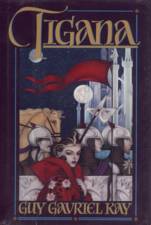

| Click on a book's image or title to order from Amazon.com |

Tigana
ROC/Penguin, HC, © 1990, 608 pp, ISBN #0-451-45776-5Reviewed September 2002
Tigana is a rather peculiar epic fantasy. It's partly peculiar because it feels rushed, despite its length. It's also peculiar because of Guy Gavriel Kay's strange handling of structure and narrative. Despite this, it's often a powerful story.
In a fictional world, the peninsula of The Palm is the tip of a continent located between two warring nations: The Empire of Barbadior to the east, and the Kingdom of Ygrath to the west. The book opens with a prologue in which the Palm is being systematically conquered by these two nations, each invading force led by a powerful wizard. Brandin, king of Ygrath, is leading his forces permanently, but sends his son to handle the southern province of Tigana. Alas, the Tiganans win the battle and slay Brandin's son, bringing his wrath down upon them. Brandin utterly crushes the Tiganan forces, razes their cities, and then casts a spell so that no one not born in Tigana before its fall can remember that nation or hear its name. He then resolves to remain in the Palm and extend his life until all such people have died, thus erasing Tigana from history.
20 years later, a young singer named Devin and his troupe come to the province of Astibar, where he gets caught up in a scheme to overthrow Alberico, the tyrant who rules the eastern Palm as Brandin rules the west. He learns of his heritage and becomes an ally of Alessan, who is leading a band of rebels attempting to restore Tigana to history and evict both tyrants from the Palm. Tigana is partly the story of their struggle.
It's also the story of Dianora, who was a young girl when Tigana was conquered, and whose brother Bard is part of Alessan's group. Dianora is herself on a quest to restore Tigana's name, and has managed to become a concubine of Brandin's. Unfortunately for her schemes, Brandin is in many ways an admirable man and ruler, and Dianora has found herself falling in love with him.
Tigana's strength is the way it muddles right and wrong in the struggle between sides. While Alberico is clearly simply ambitious - if not downright evil - Brandin has redeeming qualities, and has managed to unite part of the squabbling Palm in a reasonably prosperous society. His unwavering course of revenge against Tigana makes him a marked man, however, as does his abandoning of his own kingdom in his quest. Meanwhile, Alessan's own motives sometimes seem suspect: Does he want to rule the Palm himself? Does he simply want to restore Tigana's name? Is he truly doing the right thing?
(For my money, it seems clear that both Brandin and Alberico have committed atrocities which make them unfit rulers, and though Alessan might not be a good ruler - assuming he becomes ruler - ousting them is Job One.)
Its weakness is that Kay's writing is often too muddled to use the irony and the tragedy of the situation to its best advantages. Alberico is too one-dimensional, and Brandin is too much in the background of the story. He seems like a just and wise ruler - Tigana notwithstanding - but it's not certain that people are really better under his rule than under others', and we don't get close enough to him to truly feel for his predicament.
Kay introduces critical new elements of the story hundreds of pages into it. Dianora doesn't appear until over 100 pages in, and her story is not nearly as compelling as that of Alessan and (especially) Devin. Her appearance is jarring and I never felt particularly sympathetic towards her. He also introduces Alienor, an old friend and supporter of Alessan who has an encounter with Devin but who mostly seems superfluous to the story. As well as the Night Walkers, people who defend the Palm against powerful invaders on another plane, whose injection into the yarn seems mainly because Kay decided that Alessan couldn't plausibly achieve his goals without their aid. I wasn't convinced.
Finally, Kay's handling of basic narrative is often confused. There were several moments when I couldn't understand exactly what chain of events had just happened, and/or what the characters' motivations for their actions were. For instance, the actions which directly lead to Devin joining up with Alessan are not really explained, and it was never really detailed what happened to get them together during a sequence in the woods. This makes the book feel unfinished or improperly edited or something. It's not an experience I often have when reading a novel.
The book does wind up with a powerful climax, however, and some deep ironies in how the climactic events play out, and that makes it fairly worth the read. Getting there, however, is often rather haphazard, and it prevents the book from ranking with the better fantasy novels I've read.
hits since 14 September 2002.